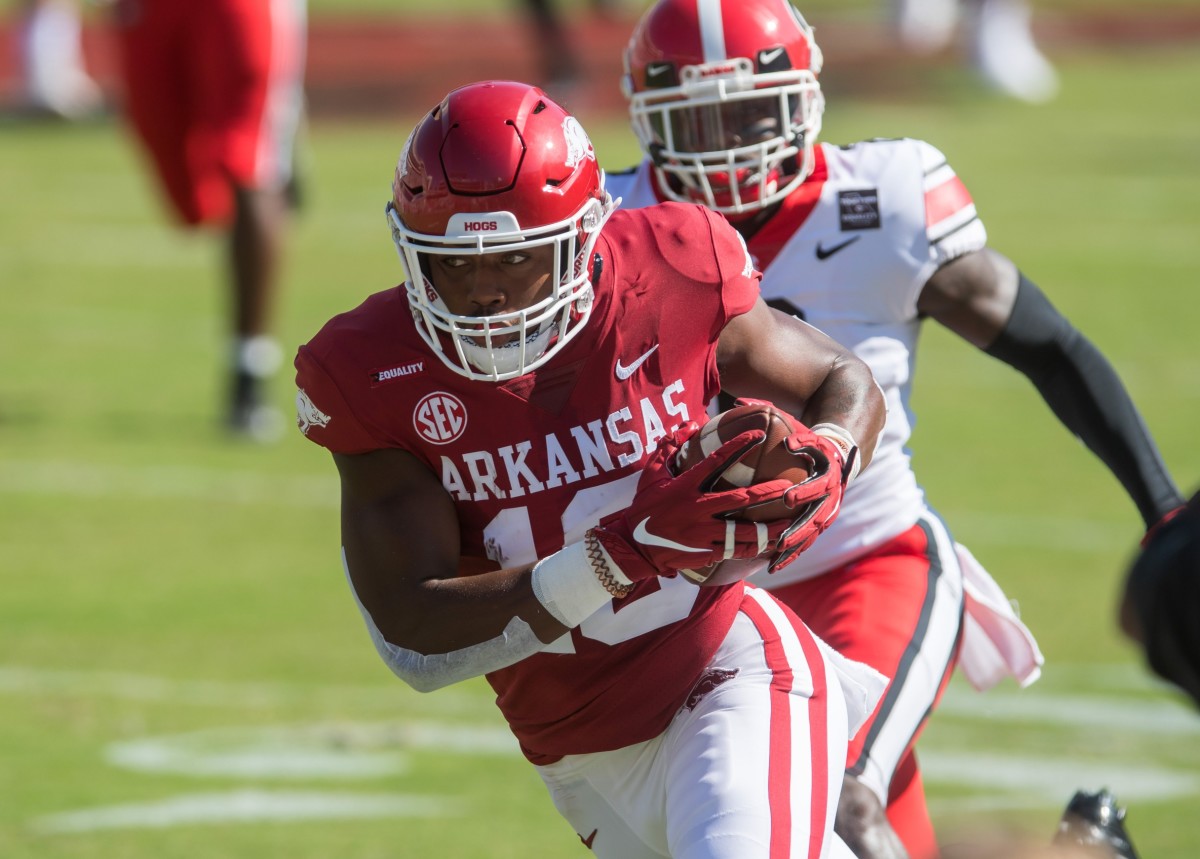Treylon Burks and Asthma: Why Now? What to Expect?
NASHVILLE – When Tennessee Titans wide receivers coach Rob Moore said last week that Treylon Burks had asthma, it provided some factual clarity on the first-round draft pick’s bumpy offseason.
It also offered an opportunity to delve deeper into asthma and its impact on high-level athletes like Burks – how common the issue is, what might be triggering Burks’ asthma, and how it might affect his Titans future.
Burks has not been a full participant in any of the Titans’ rookie minicamp practices and OTA sessions open to the media, and he didn’t practice at all last Tuesday.
His next test could come as early as Tuesday, when the Titans open their mandatory minicamp, on a day with forecasted high temperatures in the upper 90s and heat indexes of well over 100 degrees. How much and how well Burks performs in minicamp will give us an indication of his progress since he first had on-field breathing issues just over a month ago.
The bigger-picture question for Burks, the team and Titans fans is not about this week, though. It’s about months and years down the line, as the Titans seek a capable replacement for Pro Bowl wide receiver A.J. Brown, who Tennessee dealt to Philadelphia just before selecting Burks in the draft.
Will asthma affect Burks’ future in that regard?
Two medical experts in the field presented a cautiously optimistic outlook when they spoke last week to All Titans.
“It doesn’t have to limit you,” Dr. Purvi Parikh, an allergist and immunologist with the non-profit Allergy & Asthma Network. said. “Asthma is a serious condition. It’s a chronic condition. But if it’s well-managed … it can be controlled. I’m hoping that if (Burks) does have the appropriate care, then it doesn’t have to interfere, even with high-level sports.”
Squeezed by the muscle around it

One quick disclaimer: It’s possible that more than just asthma is to blame for Burks’ slow start. Coach Mike Vrabel has mentioned a couple of times – without specifically naming Burks – that some rookies struggle to stay in peak football condition between the NFL Combine and the first rookie minicamp.
That issue seems like a straightforward one to address.
Asthma is more complicated.
The Mayo Clinic defines asthma as a respiratory condition in which the airways narrow and swell and may produce extra mucus. This can make breathing difficult and trigger coughing, a whistling sound (wheezing) when one breathes out, and shortness of breath.
Vanderbilt University Professor of Medicine Stokes Peebles, a doctor who specializes in allergically mediated and virally induced lung inflammation, compared a person’s normal airways to a cardboard toilet-paper tube – with air flowing smoothly into an opening about one-and-a-half inches in diameter.
“But let’s say you put your hand around that tube, and you crunch it up, and now the tube is much more narrow as a result of the fact that you put your hand around it and you’re squeezing it,” Peebles said. “That’s what asthma is. It’s basically the airway, and it’s being squeezed by the muscle around it, and it’s preventing air from going in and out of the lungs.”
A rise in asthma attacks

Burks is far from the first NFL player to suffer from asthma.
Two of the more famous who dealt with the condition during their careers were Pro Football Hall of Fame members Emmitt Smith and Jerome Bettis. Among current players who have asthma are standouts like Buffalo’s Von Miller, Cleveland’s Myles Garrett and Seattle’s Shelby Harris, along with journeyman defensive lineman Kyle Peko, who played eight games for the Titans last season.
One of the key questions in controlling asthma for Burks – or anyone else – is figuring out what triggers the attacks.
Seasonal allergies are the biggest cause of asthma, and they are especially concerning in Nashville, which has very high pollen counts during much of the year. Tree pollen wreaks havoc in early to mid-spring, grass pollens carry the torch from late spring to mid-summer, and ragweed takes over in late summer through early fall.
“May is peak pollen season everywhere, so in the past month, you’ve been seeing a rise in asthma attacks in general, and the allergy seasons have been getting particularly worse due to a variety of factors like climate change and global warming,” Parikh said. “Over the last few decades, allergy season has now lengthened by 21 days – and there’s higher amounts of pollen in the air.”
Other factors like heat and humidity, along with stress and anxiety, could be playing a role in triggering Burks’ attacks as well. It’s also possible Arkansas native and Razorbacks record-setter could be suffering from exercise-induced asthma, which is a narrowing of the airways in the lungs triggered by strenuous exercise.
Why now and not in college?

Peebles said most people suffering from asthma in their early 20s, such as the 22-year-old Burks, have had the condition since they were kids.
Indeed, Vrabel indicated the Titans knew Burks had asthma when they drafted him, which would not be a surprise given the lengthy medical check-ups that top prospects go through at the NFL Scouting Combine and during visits to teams.
So, assuming Burks has had asthma for a while, why does it appear it’s impacting him more now than before?
“Because asthma is a chronic condition, it can stay controlled and quiet for many years,” Parikh said. “So just moving from Arkansas to Nashville could be a big enough change in his environment to trigger it. And this was an especially bad pollen season, so even people who were living in the same place – who didn’t have problems the last year or the year before – were coming to me with their asthma acting up.”
Peebles said the pollens in Arkansas are the same as the ones in Tennessee, but he offered another possible reason Burks’ asthma might be impacting him more now than in college: Since college football teams have early spring practices – and then don’t play until the fall – this year might have marked the first time Burks has done a lot of on-the-field work in bad-allergy months like May and June.
“This may have been the first summer he’s been working out in months like June to this level,” Peebles said. “He didn’t do this in high school because practices start in August. College (practices) usually start in August, too. So even if he had some degree of asthma in high school and college, he may not have been exerting himself to the same level at this time of year.”
Reasons for optimism

The process of controlling Burks’ asthma is apparently still a work in process, considering the amount of time he’s spent on the practice field compared to his Titans teammates.
But there are reasons for optimism.
One is as simple as the change of seasons, as the eventual arrival of cooler months this fall will lessen the pollen count, with the first frost really bringing a hammer to the allergens.
Second is the matter of Burks’ track record at Arkansas. He couldn’t have been too adversely impacted by asthma in college, as Burks played in 32 of 34 regular-season games over three years – missing one game with a knee injury and the other with reported concussion concerns.
“Since he didn’t have trouble at Arkansas, there’s a good chance he won’t have trouble with the Titans,” Peebles said. “If I had to bet, the greatest predictor of future outcome is the past, right? So, if he played every game at Arkansas (during his final season) and he was performing at a high level … then most likely, he’s never going to have problems when the (NFL) season starts.”
Third and probably most important is the availability of short and long-term asthma medicines – such as inhalers, like the one Burks was seen using during the first day of rookie minicamp. Many deliver varying degrees of something called beta-agonists, which can relax muscles around the airways that might tighten during an asthma attack. In addition, preventive medications such as corticosteroids, used regularly, can reduce or eliminate asthma attacks.
That line of reasoning may allow Titans fans to breathe a little easier.
“I think it all comes down to how well he’s managed and controlled,” Parikh said. “Given that he’s an NFL athlete, I would think he has access to some of the best medical physicians and professionals.
“With that in mind, I don’t think it should limit him long-term. Many athletes live with asthma. The key is getting it properly managed.”
